Cats are fascinating creatures that have unique sleep-wake cycles, which can sometimes disrupt their owners’ sleep. Have you ever wondered why your furry friend seems so active at night? Well, it turns out that cats are crepuscular animals, meaning they are most active during the evening or early morning.
Unlike nocturnal animals, who are active solely at night, cats prefer to hunt and play during the twilight hours when their prey is most active. This behavior is deeply ingrained in their natural instincts and is known as their nocturnal behaviors.
This article will delve into the common nighttime behaviors displayed by cats, explore the factors contributing to excessive nocturnal activity, and provide tips for managing your cat’s nighttime antics to ensure a harmonious coexistence between you and your feline friend.
Key Takeaways:
- Cats are crepuscular animals, preferring to be active during the evening and early morning.
- Nocturnal behaviors are deeply rooted in a cat’s natural hunting instincts.
- Factors such as being home alone, boredom, hunger, old age, and health conditions can contribute to excessive nighttime activity in cats.
- Strategies for managing cat nighttime activity include playtime, feeding schedule adjustments, providing daytime activity, and creating a sleep-friendly environment.
- Medications and veterinary support may be necessary in some cases, but should be used under professional guidance.
Common Nighttime Behaviors in Cats
Cats are known for their mysterious and independent nature, especially when it comes to their nighttime habits. Their nocturnal behaviors can sometimes disrupt their owner’s sleep and leave them wondering what goes on when the lights go out. Let’s explore some of the common nighttime behaviors exhibited by our feline friends.
1. Night Prowling Feline
One of the most noticeable behaviors is when cats engage in nighttime prowling. They roam around the house, investigating every nook and cranny, and ensuring their territory is secure. This behavior is a reflection of their natural hunting instincts, as cats are crepuscular animals that are most active during dawn and dusk.
2. Cats Night Time Exploration
Cats have an innate curiosity and desire for exploration, and this often intensifies at night. They may venture into different rooms, jump on furniture, climb shelves, or even try to squeeze into small spaces they normally wouldn’t during the day. It’s their way of satisfying their natural curiosity while enjoying the freedom of the nighttime hours.
3. Nocturnal Behaviors of Cats
During the night, cats may exhibit playful behaviors that can be a bit too wild for our liking. They may pounce on their owner’s feet, nibble on toes, or attack ears while their owners are trying to sleep. This behavior stems from their hunting instincts and is a way for them to hone their skills and stay mentally and physically active.
These nighttime behaviors can be both amusing and frustrating for cat owners. While it’s essential to understand and accept these natural instincts, it’s also important to find ways to address and manage them effectively to ensure a peaceful night’s sleep for both cats and their owners.
Factors Contributing to Excessive Nocturnal Activity
There are several factors that can contribute to a cat’s excessive nocturnal activity. Understanding these factors can help cat owners better manage their furry companions’ nighttime behaviors.
Cats Awake at Night
- Being home alone during the day can result in cats having excess energy and restlessness at night.
- Boredom plays a significant role in nocturnal activity, as cats require mental and physical stimulation throughout the day to keep them engaged.
- Hunger is another common factor, as cats have a natural instinct to wake during the night to feed.
- Old age can also contribute to increased nighttime activity, as senior cats may experience discomfort, pain, or other health issues that disrupt their sleep patterns.
- Various health conditions such as anxiety, hyperthyroidism, chronic illness, and dementia can cause cats to be hyperactive or vocal during the night.
To help address these issues, it’s important for cat owners to provide adequate mental and physical stimulation throughout the day, ensure regular feeding schedules, and consult with a veterinarian if any underlying health conditions are suspected.
The wellbeing of a cat is influenced by various factors, including its environment, health, and daily routine. By identifying the root cause of excessive nocturnal activity, cat owners can take appropriate steps to address and manage their cat’s nighttime behaviors effectively.
Creating a conducive sleep environment, such as providing a comfortable bed in a quiet area away from distractions, can also help promote better sleep habits for cats. Additionally, establishing a consistent bedtime routine and incorporating play or relaxation activities before bed can help signal to the cat that it’s time to wind down for the night.
By understanding the factors that contribute to excessive nocturnal activity and implementing strategies to address them, cat owners can help their feline companions establish healthier sleep patterns, leading to improved overall well-being for both the cat and the owner.
Tips for Managing Cat Nighttime Activity
Managing your cat’s nighttime activity can be challenging, but there are several effective strategies you can employ to help promote better sleep for both you and your feline friend. By implementing these tips, you can ensure a more peaceful and restful night for everyone involved.
1. Spend Quality Playtime with Your Cat
Engaging in interactive play sessions with your cat during the evening can help tire them out and promote sleep at night. Use toys that mimic prey and encourage your cat to chase, pounce, and stalk. This physical and mental stimulation will help expend their energy and encourage a more relaxed state.
2. Change Your Cat’s Feeding Schedule
Consider offering smaller meals throughout the day and moving the evening meal to a later time. This can help promote sleepiness as cats naturally wake in the night to feed. By aligning their feeding schedule with their natural instincts, you can encourage them to sleep more during the night.
3. Provide Daytime Activity and Mental Stimulation
It’s important to provide your cat with plenty of daytime activity and mental stimulation. Offer toys, puzzles, and interactive play sessions that keep them engaged and entertained. This will help keep their minds and bodies active during the day, reducing the likelihood of excessive nighttime activity.
4. Create a Separate Sleep Environment
Managing the sleep environment is essential in reducing disruptions to your sleep. Create a separate and comfortable space for your cat to sleep in, such as a cozy bed or a designated sleeping area. Limit their access to your bedroom to minimize disturbances and ensure you can get a good night’s rest.
Remember that consistency is key when implementing these strategies. Cats thrive on routine, so establishing a consistent sleep schedule and sticking to it will help them adjust and adapt to healthier sleep patterns. Be patient and understanding as it may take some time for your cat to fully adjust.
By incorporating these tips into your routine, you can effectively manage your cat’s nighttime activity and enhance the overall quality of sleep for both you and your furry companion.
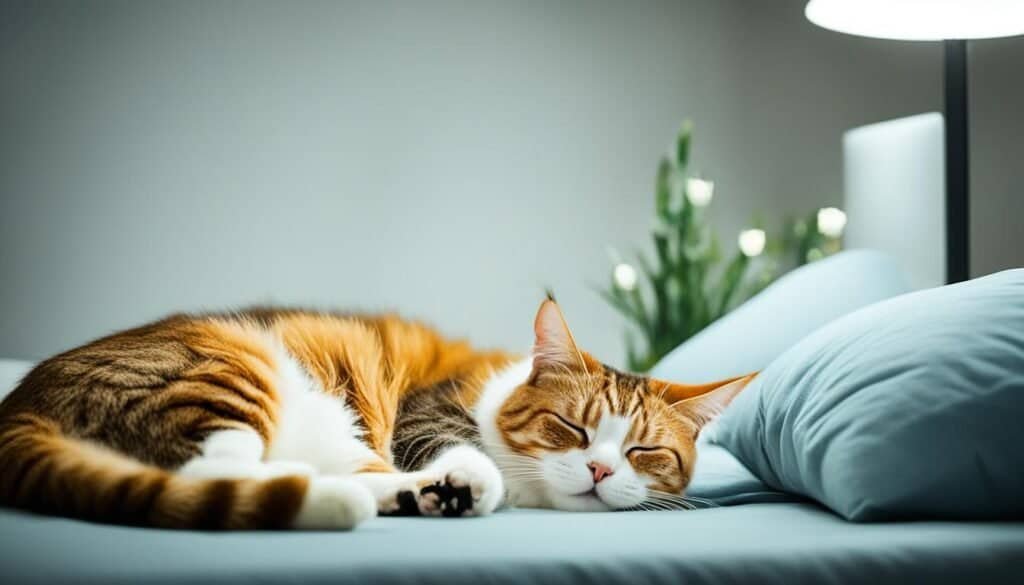
Medications and Veterinary Support
In some cases, behavior modification techniques may not be enough to address excessive cat nighttime activity. When efforts to manage your cat’s nocturnal behavior prove insufficient, it may be necessary to explore other options, such as medications prescribed by a veterinarian or natural sleep remedies.
Veterinary prescription medications, such as sleep aids or anxiety medications, can help regulate your cat’s nighttime behavior. These medications are specifically formulated for cats and can provide the necessary support to promote a more restful sleep. Consulting with a veterinarian is crucial to ensure proper dosage and usage, as well as to discuss any potential risks or side effects.
Alternatively, natural sleep remedies like melatonin or valerian can be considered. Melatonin is a hormone that helps regulate sleep patterns in humans and can have similar effects in cats. Valerian is an herb known for its calming properties and can help promote relaxation and sleep. However, it’s important to note that these natural remedies should be used cautiously and under veterinary guidance to ensure safety and effectiveness for your cat.
If your cat’s excessive nocturnal behavior persists or worsens despite attempts to manage it, seeking veterinary advice is highly recommended. A veterinarian can assess your cat’s overall health, rule out any underlying medical conditions that may be contributing to the behavior, and provide further guidance on the most appropriate course of action.
Cat Nighttime Activity – Myth or Reality?
There is a common misconception that cats are nocturnal animals. Contrary to popular belief, cats are actually crepuscular in nature. This means that they are most active during the twilight hours of dawn and dusk.
This behavior is deeply ingrained in their ancestral hunting instincts, as these low-light conditions provide an optimal opportunity for cats to stalk and capture their prey. During these times, visibility is reduced, making it easier for cats to remain undetected while they hunt.
Understanding the crepuscular nature of cats is crucial for cat owners when it comes to managing their cat’s nighttime activity. Recognizing that cats are naturally inclined to be more active during specific periods of the day can help owners adjust and accommodate their cat’s behavior.
While cats may exhibit some activity at night, they often spend significant portions of the night sleeping. In fact, cats typically sleep for 12 to 20 hours a day, but their sleep is segmented into multiple naps interspersed with brief periods of activity. This segmented sleep pattern allows cats to remain alert and have bursts of energy during the late evening and early morning hours, aligning with their crepuscular instincts.
Creating a comfortable sleep environment for cats and providing ample stimulation during the day can help regulate their sleep-wake cycles and minimize disruptive nighttime behavior. By acknowledging and adapting to the crepuscular nature of cats, owners can foster a harmonious living environment for both themselves and their feline companions.
Myth Busted: Cats are Crepuscular, Not Nocturnal!
“Contrary to popular belief, cats are not nocturnal. They are actually crepuscular, meaning they are most active during the twilight hours of dawn and dusk. Understanding this behavioral characteristic is essential for cat owners to provide a conducive sleep environment for their feline friends.” – Dr. Christine Lee, Feline Behavior Specialist
Cat Sleep Patterns
While cats do sleep at night, their sleep patterns differ from that of humans. Cats typically sleep for 12 to 20 hours a day, but their sleep is segmented, with multiple naps interspersed with periods of activity. This segmented sleep allows cats to stay alert and have bursts of energy during the late evening and early morning hours. Understanding and accepting these sleep patterns can help cat owners adjust their expectations and create a conducive sleep environment.
Cats, similar to humans, experience different stages of sleep, including REM (Rapid Eye Movement) sleep and non-REM sleep. However, unlike humans who have consolidated sleep periods over several hours, cats have a polyphasic sleep pattern, which means they sleep in shorter bursts throughout the day and night.
This unique sleep pattern is rooted in their evolutionary history as predators. Cats are natural hunters and their ancestors would often conserve energy during the day and spend their nights hunting. As domesticated pets, cats have retained this behavior to some extent.
During their waking hours, cats engage in various activities such as grooming, exploring their surroundings, playing, and hunting (even if just imaginary). These activities help fulfill their instinctual needs and maintain their sense of alertness and security.
It’s important to note that while cats are adaptable, sudden disruptions to their sleep patterns or excessive sleepiness can be signs of underlying health issues. If your cat’s sleep patterns drastically change or if they seem excessively sleepy or lethargic, it’s advisable to consult with a veterinarian for further evaluation.
“Understanding and accepting a cat’s natural sleep patterns is crucial for promoting their overall well-being. By providing a safe and comfortable environment, ensuring regular play and mental stimulation, and recognizing their need for both rest and activity, we can help our feline companions lead healthy and fulfilling lives.”
Creating a sleep-friendly environment for your cat involves ensuring a quiet and calm space, free from disturbances, and providing them with a cozy bed or resting area. Additionally, offering interactive toys and engaging in playtime during their awake periods can help balance their energy levels and promote a more restful sleep.
Patience and understanding are key when it comes to accommodating a cat’s sleep patterns. Embracing the unique nature of their sleep and adjusting our expectations can lead to a harmonious coexistence between cat and owner, with both parties enjoying the benefits of a good night’s rest.
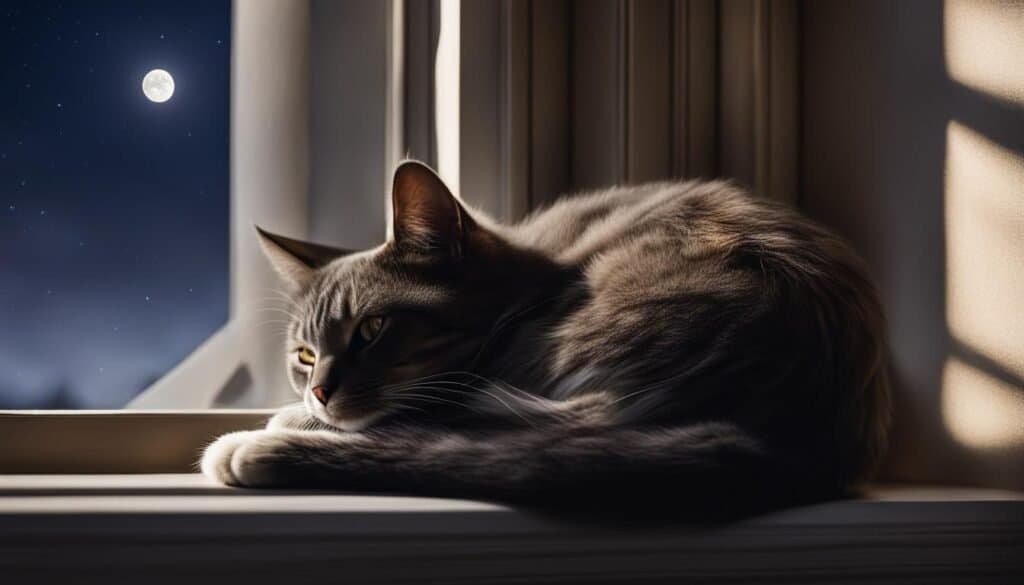
Factors Influencing Cat Nighttime Activity
Several factors can influence a cat’s nighttime activity. These factors include age, health conditions, breed and activity level, and environmental factors.
Age and Nighttime Activity
Cats of different ages have varying sleep patterns and activity levels. Kittens, for example, require more sleep but also tend to have longer periods of activity during the night. As cats mature, their sleep-wake cycles may become more aligned with their owners’ schedules.
Health Conditions Affecting Sleep
Certain health conditions can disrupt a cat’s sleep patterns. Cats with vision loss may experience disorientation and be more active at night. Changes in blood pressure or hyperthyroidism can also contribute to sleep disruptions. If you notice significant changes in your cat’s sleep patterns, it’s important to consult with a veterinarian to rule out any underlying health issues.
Breed and Activity Level
Different cat breeds have varying activity levels, and some breeds are more energetic and prone to nighttime activity than others. For example, Bengals and Siamese cats are known for their high energy levels, which may lead to increased nighttime activity. Understanding your cat’s breed and activity level can help you manage their sleep patterns more effectively.
Environmental Factors and Sleep Disruption
The environment in which a cat lives can also impact their nighttime activity. Changes in the home, such as the introduction of a new pet or alterations in the owner’s schedule, can disrupt a cat’s sleep. Cats are known for their sensitivity to changes in their surroundings, and these changes can affect their sleep-wake cycles. Creating a calm and consistent environment can help minimize sleep disruptions for your cat.
In summary, age, health conditions, breed and activity level, and environmental factors all play a role in a cat’s nighttime activity. By understanding these factors, cat owners can take steps to create a sleep-friendly environment for their feline companions.
Strategies for Encouraging Cat Sleep at Night
Implementing strategies to encourage cat sleep at night can help alleviate disruptions in the owner’s sleep. By incorporating these techniques into your cat’s routine, you can create a more harmonious nighttime environment. Here are some effective strategies to consider:
Increase Daytime Enrichment
It’s important to provide your cat with ample opportunities for mental and physical stimulation during the day. Engage in regular play sessions, use interactive toys, and create an environment that encourages exploration. By keeping your cat active and engaged during the day, they are more likely to sleep soundly at night.
Play to the Natural Rhythm
Cats have an innate sleep-wake cycle that is influenced by their crepuscular nature. To help your cat adjust to a sleep routine, engage in a play session just before bedtime. This will help your cat release any pent-up energy and promote a sense of relaxation and readiness for sleep. Additionally, offering a small meal after playtime can further signal to your cat that it’s time to settle down for the night.
Create a Comfortable Sleep Environment
Provide your cat with dedicated sleeping areas that are cozy and inviting. Use soft bedding and consider creating a designated sleeping spot away from any noise or distractions. This will help your cat associate specific areas with rest and relaxation, making it easier for them to settle down and sleep through the night.
“A comfortable sleep environment can contribute to better sleep habits for your cat.” – Dr. Emily Wilson, Veterinarian
Use Supplements with Caution
While certain supplements may be marketed as aids for promoting sleep in cats, it’s important to approach their use with caution. Some supplements may interact with other medications or have unintended side effects. Before introducing any new substances into your cat’s routine, consult with a veterinarian to ensure their safety and efficacy.
By implementing these strategies, you can help encourage your cat to sleep more at night, promoting a peaceful and restful environment for both you and your feline companion.
Conclusion
Managing cat nighttime activity and improving sleep patterns in cats is crucial for supporting feline well-being and ensuring a peaceful coexistence with their owners. By understanding the underlying factors contributing to excessive nocturnal behavior, cat owners can implement effective strategies to address and redirect their cat’s nighttime activity.
Addressing factors such as being home alone, boredom, hunger, old age, and health conditions can help in managing cat nighttime activity. Providing adequate mental and physical stimulation through playtime and interactive toys during the evening can tire out cats and promote better sleep at night.
Creating a comfortable sleep environment with designated sleeping areas and cozy bedding can also contribute to cats’ improved sleep patterns. Additionally, seeking veterinary advice when needed, especially for persistent or worsening excessive nocturnal behavior, can help rule out any underlying health conditions and ensure appropriate interventions.
By adopting a holistic approach and being open to adjusting routines, cat owners can not only improve their own sleep but also support their feline companions’ well-being. A harmonious coexistence where both cats and owners can rest peacefully is attainable with patience, understanding, and the implementation of effective cat nighttime activity management strategies.
FAQ
What are some common nighttime behaviors in cats?
What factors contribute to excessive nocturnal activity in cats?
How can I manage my cat’s nighttime activity?
Are there medications available to help with cat nighttime behavior?
Are cats nocturnal animals?
How do cats sleep at night?
What factors can influence a cat’s nighttime activity?
How can I encourage my cat to sleep at night?
Why is it important to manage cat nighttime activity?
Last modified: February 20, 2024


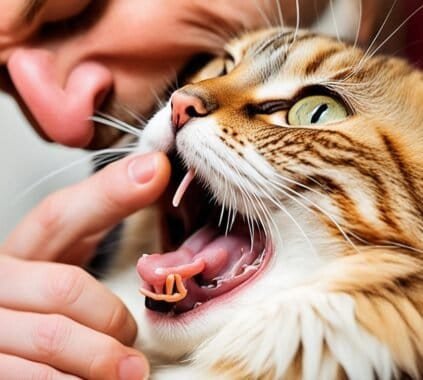

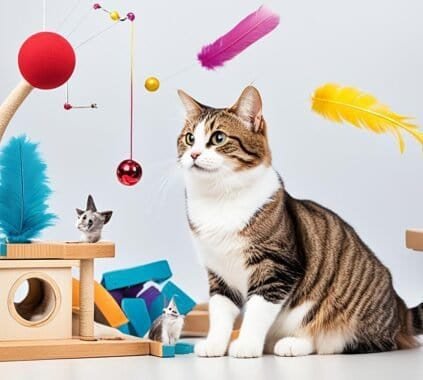
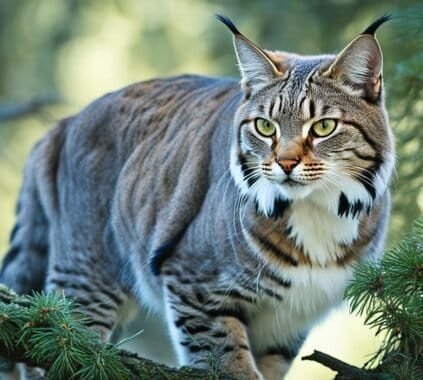








[…] by their owners, their ingrained hunting instincts remain a prominent aspect of their behavior. Understanding cat hunting instincts and how they utilize their hunting techniques can provide valuable insights into […]
[…] cues. Learn how to recognize cat language basics, and figure out the most common combinations, to understand what your cat is saying to you and to the other pets in your […]
[…] consistently, it’s important to consult a veterinarian or a professional behaviorist to understand and address your cat’s […]